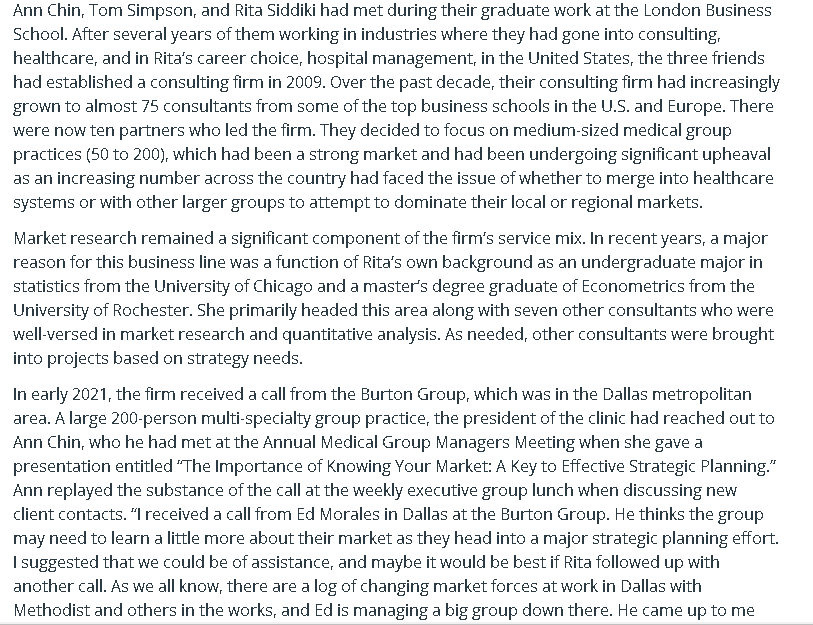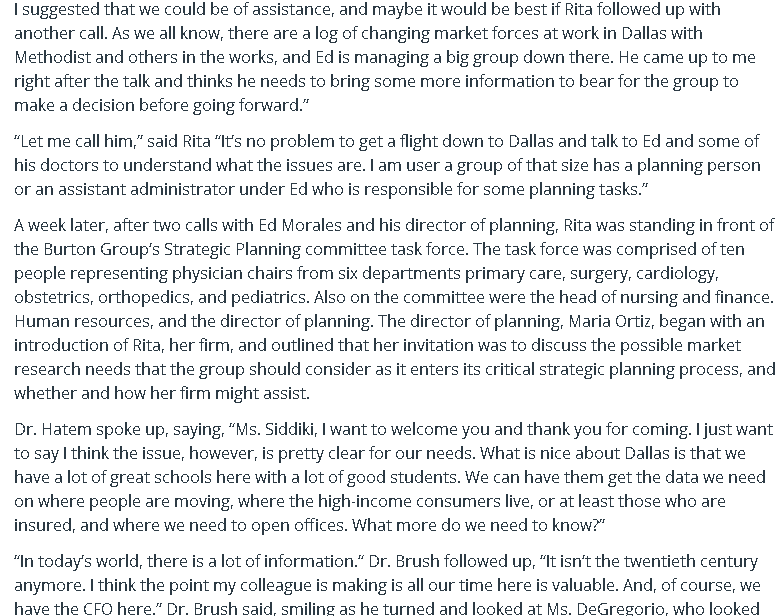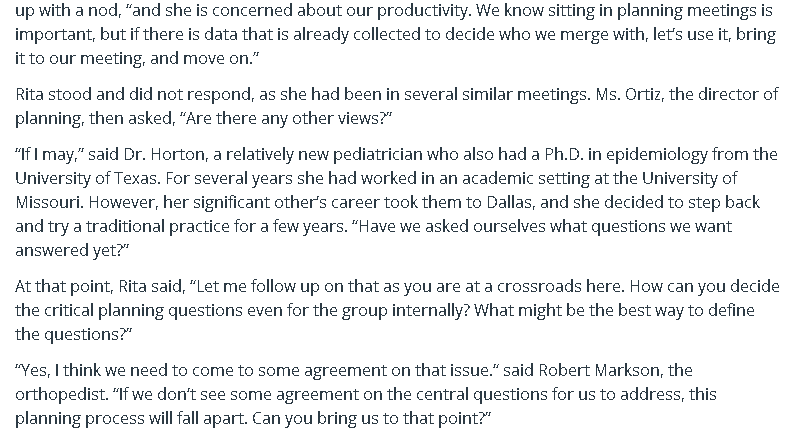Answered step by step
Verified Expert Solution
Question
1 Approved Answer
If you were in Ritas place and you were to return to this group in two weeks with an initial research plan to help the



If you were in Ritas place and you were to return to this group in two weeks with an initial research plan to help the strategic planning committee what would you initially suggest to them?
Ann Chin, Tom Simpson, and Rita Siddiki had met during their graduate work at the London Business School. After several years of them working in industries where they had gone into consulting, healthcare, and in Rita's career choice, hospital management in the United States, the three friends had established a consulting firm in 2009. Over the past decade, their consulting firm had increasingly grown to almost 75 consultants from some of the top business Schools in the U.S. and Europe. There were now ten partners who led the firm. They decided to focus on medium-sized medical group practices (50 to 200), which had been a strong market and had been undergoing significant upheaval as an increasing number across the country had faced the issue of whether to merge into healthcare systems or with other larger groups to attempt to dominate their local or regional markets. Market research remained a significant component of the firm's service mix. In recent years, a major reason for this business line was a function of Rita's own background as an undergraduate major in statistics from the University of Chicago and a master's degree graduate of Econometrics from the University of Rochester. She primarily headed this area along with seven other consultants who were well-versed in market research and quantitative analysis. As needed, other consultants were brought into projects based on strategy needs. In early 2021, the firm received a call from the Burton Group, which was in the Dallas metropolitan area. A large 200-person multi-specialty group practice, the president of the clinic had reached out to Ann Chin, who he had met at the Annual Medical Group Managers Meeting when she gave a presentation entitled "The Importance of Knowing Your Market: A key to Effective Strategic Planning." Ann replayed the substance of the call at the weekly executive group lunch when discussing new client contacts. "I received a call from Ed Morales in Dallas at the Burton Group. He thinks the group may need to learn a little more about their market as they head into a major strategic planning effort. I suggested that we could be of assistance, and maybe it would be best if Rita followed up with another call. As we all know, there are a log of changing market forces at work in Dallas with Methodist and others in the works, and Ed is managing a big group down there. He came up to me I suggested that we could be of assistance, and maybe it would be best if Rita followed up with another call. As we all know, there are a log of changing market forces at work in Dallas with Methodist and others in the works, and Ed is managing a big group down there. He came up to me right after the talk and thinks he needs to bring some more information to bear for the group to make a decision before going forward." "Let me call him," said Rita "It's no problem to get a flight down to Dallas and talk to Ed and some of his doctors to understand what the issues are. I am user a group of that size has a planning person or an assistant administrator under Ed who is responsible for some planning tasks." A week later, after two calls with Ed Morales and his director of planning, Rita was standing in front of the Burton Group's Strategic Planning committee task force. The task force was comprised of ten people representing physician chairs from six departments primary care, surgery, cardiology, obstetrics, orthopedics, and pediatrics. Also on the committee were the head of nursing and finance. Human resources, and the director of planning. The director of planning, Maria Ortiz, began with an introduction of Rita, her firm, and outlined that her invitation was to discuss the possible market research needs that the group should consider as it enters its critical strategic planning process, and whether and how her firm might assist. Dr. Hatem spoke up, saying, "Ms. Siddiki, I want to welcome you and thank you for coming. I just want to say I think the issue, however, is pretty clear for our needs. What is nice about Dallas is that we have a lot of great schools here with a lot of good students. We can have them get the data we need on where people are moving, where the high-income consumers live, or at least those who are insured, and where we need to open offices. What more do we need to know?" "In today's world, there is a lot of information." Dr. Brush followed up, "It isn't the twentieth century anymore. I think the point my colleague is making is all our time here is valuable. And, of course, we have the CFO here." Dr. Brush said, smiling as he turned and looked at Ms. DeGregorio, who looked up with a nod, "and she is concerned about our productivity. We know sitting in planning meetings is important, but if there is data that is already collected to decide who we merge with, let's use it, bring it to our meeting, and move on." Rita stood and did not respond, as she had been in several similar meetings. Ms. Ortiz, the director of planning, then asked, "Are there any other views?" "If I may," said Dr. Horton, a relatively new pediatrician who also had a Ph.D. in epidemiology from the University of Texas. For several years she had worked in an academic setting at the University of Missouri. However, her significant other's career took them to Dallas, and she decided to step back and try a traditional practice for a few years. "Have we asked ourselves what questions we want answered yet?" At that point, Rita said, "Let me follow up on that as you are at a crossroads here. How can you decide the critical planning questions even for the group internally? What might be the best way to define the questions?" "Yes, I think we need to come to some agreement on that issue." said Robert Markson, the orthopedist. "If we don't see some agreement on the central questions for us to address, this planning process will fall apart. Can you bring us to that point?" Ann Chin, Tom Simpson, and Rita Siddiki had met during their graduate work at the London Business School. After several years of them working in industries where they had gone into consulting, healthcare, and in Rita's career choice, hospital management in the United States, the three friends had established a consulting firm in 2009. Over the past decade, their consulting firm had increasingly grown to almost 75 consultants from some of the top business Schools in the U.S. and Europe. There were now ten partners who led the firm. They decided to focus on medium-sized medical group practices (50 to 200), which had been a strong market and had been undergoing significant upheaval as an increasing number across the country had faced the issue of whether to merge into healthcare systems or with other larger groups to attempt to dominate their local or regional markets. Market research remained a significant component of the firm's service mix. In recent years, a major reason for this business line was a function of Rita's own background as an undergraduate major in statistics from the University of Chicago and a master's degree graduate of Econometrics from the University of Rochester. She primarily headed this area along with seven other consultants who were well-versed in market research and quantitative analysis. As needed, other consultants were brought into projects based on strategy needs. In early 2021, the firm received a call from the Burton Group, which was in the Dallas metropolitan area. A large 200-person multi-specialty group practice, the president of the clinic had reached out to Ann Chin, who he had met at the Annual Medical Group Managers Meeting when she gave a presentation entitled "The Importance of Knowing Your Market: A key to Effective Strategic Planning." Ann replayed the substance of the call at the weekly executive group lunch when discussing new client contacts. "I received a call from Ed Morales in Dallas at the Burton Group. He thinks the group may need to learn a little more about their market as they head into a major strategic planning effort. I suggested that we could be of assistance, and maybe it would be best if Rita followed up with another call. As we all know, there are a log of changing market forces at work in Dallas with Methodist and others in the works, and Ed is managing a big group down there. He came up to me I suggested that we could be of assistance, and maybe it would be best if Rita followed up with another call. As we all know, there are a log of changing market forces at work in Dallas with Methodist and others in the works, and Ed is managing a big group down there. He came up to me right after the talk and thinks he needs to bring some more information to bear for the group to make a decision before going forward." "Let me call him," said Rita "It's no problem to get a flight down to Dallas and talk to Ed and some of his doctors to understand what the issues are. I am user a group of that size has a planning person or an assistant administrator under Ed who is responsible for some planning tasks." A week later, after two calls with Ed Morales and his director of planning, Rita was standing in front of the Burton Group's Strategic Planning committee task force. The task force was comprised of ten people representing physician chairs from six departments primary care, surgery, cardiology, obstetrics, orthopedics, and pediatrics. Also on the committee were the head of nursing and finance. Human resources, and the director of planning. The director of planning, Maria Ortiz, began with an introduction of Rita, her firm, and outlined that her invitation was to discuss the possible market research needs that the group should consider as it enters its critical strategic planning process, and whether and how her firm might assist. Dr. Hatem spoke up, saying, "Ms. Siddiki, I want to welcome you and thank you for coming. I just want to say I think the issue, however, is pretty clear for our needs. What is nice about Dallas is that we have a lot of great schools here with a lot of good students. We can have them get the data we need on where people are moving, where the high-income consumers live, or at least those who are insured, and where we need to open offices. What more do we need to know?" "In today's world, there is a lot of information." Dr. Brush followed up, "It isn't the twentieth century anymore. I think the point my colleague is making is all our time here is valuable. And, of course, we have the CFO here." Dr. Brush said, smiling as he turned and looked at Ms. DeGregorio, who looked up with a nod, "and she is concerned about our productivity. We know sitting in planning meetings is important, but if there is data that is already collected to decide who we merge with, let's use it, bring it to our meeting, and move on." Rita stood and did not respond, as she had been in several similar meetings. Ms. Ortiz, the director of planning, then asked, "Are there any other views?" "If I may," said Dr. Horton, a relatively new pediatrician who also had a Ph.D. in epidemiology from the University of Texas. For several years she had worked in an academic setting at the University of Missouri. However, her significant other's career took them to Dallas, and she decided to step back and try a traditional practice for a few years. "Have we asked ourselves what questions we want answered yet?" At that point, Rita said, "Let me follow up on that as you are at a crossroads here. How can you decide the critical planning questions even for the group internally? What might be the best way to define the questions?" "Yes, I think we need to come to some agreement on that issue." said Robert Markson, the orthopedist. "If we don't see some agreement on the central questions for us to address, this planning process will fall apart. Can you bring us to that pointStep by Step Solution
There are 3 Steps involved in it
Step: 1

Get Instant Access to Expert-Tailored Solutions
See step-by-step solutions with expert insights and AI powered tools for academic success
Step: 2

Step: 3

Ace Your Homework with AI
Get the answers you need in no time with our AI-driven, step-by-step assistance
Get Started


